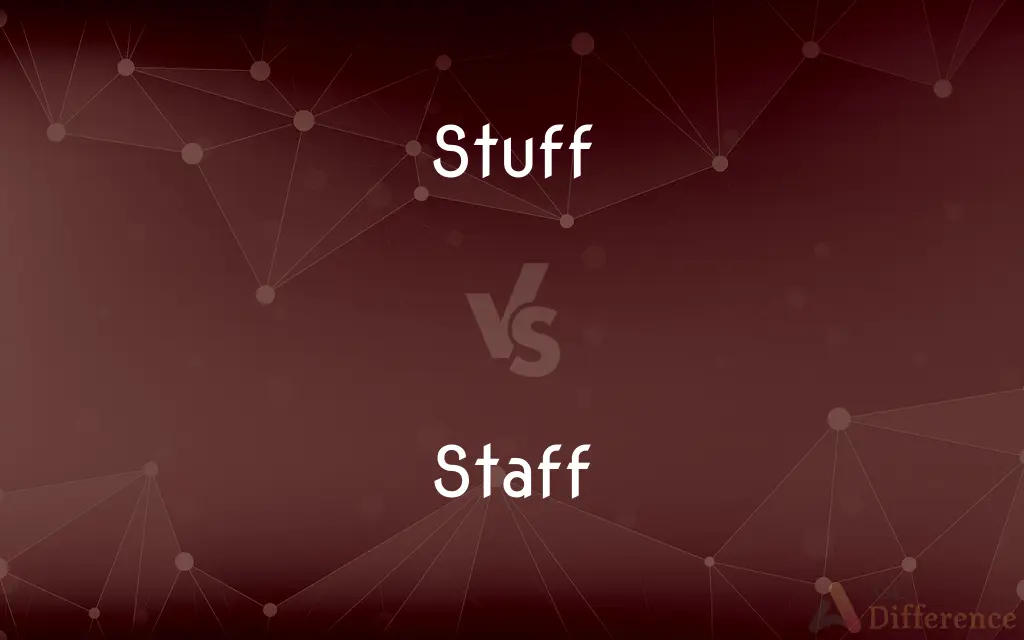Stuff vs. Staff — What's the Difference?
Edited by Tayyaba Rehman — By Urooj Arif — Updated on March 4, 2024
Stuff refers to materials, supplies, or equipment, emphasizing tangible items, while staff denotes a group of employees or personnel, highlighting human resources.

Difference Between Stuff and Staff
Table of Contents
ADVERTISEMENT
Key Differences
Stuff encompasses a wide range of materials, supplies, or equipment, focusing on physical and tangible items used for various purposes. It can refer to personal belongings, items needed for specific tasks, or general collections of things. Whereas staff specifically refers to the group of individuals employed by an organization or working on a project, emphasizing the human element in professional settings. Staff are the people who contribute their skills, expertise, and labor to achieve the goals of an organization.
While stuff can be categorized based on its physical properties, purpose, or function, such as office supplies, household items, or personal possessions, staff are organized based on roles, responsibilities, and hierarchies within an organization. Staff members may have specific titles, duties, and levels of authority, which determine their position and function within the group.
Stuff is often managed, stored, or utilized based on its utility, value, and relevance to a particular task or activity. It is an essential component of operational processes, providing the necessary tools and resources. On the other hand, managing staff involves human resource management practices, including hiring, training, development, and motivation, to ensure optimal performance and job satisfaction.
The concept of stuff is impersonal and focuses on objects that can be replaced or replenished as needed. These items are essential for the completion of tasks but do not have personal agency. Whereas staff represents a collective of individuals, each with their own unique identities, skills, and contributions to the organization, highlighting the personal and interpersonal dynamics of working relationships.
Stuff and staff both play critical roles in the functionality and success of organizations, but they do so in fundamentally different ways. Stuff supports the physical and operational needs, while staff are the backbone of strategic execution and organizational culture, driving forward the mission and values of the entity they represent.
ADVERTISEMENT
Comparison Chart
Definition
Materials, supplies, or equipment
Group of employees or personnel
Nature
Tangible and physical
Human resources, intangible
Purpose
Used for various tasks and activities
Work towards organizational goals
Management
Managed based on utility and relevance
Managed through HR practices
Contribution
Supports operational needs
Drives strategic execution and culture
Compare with Definitions
Stuff
Stuff encompasses all types of tangible items.
The garage was filled with all sorts of stuff from old tools to bicycles.
Staff
It includes individuals working towards a common goal.
Our staff is dedicated to providing excellent customer service.
Stuff
It refers to personal belongings or possessions.
Please move your stuff off the couch so we can sit.
Staff
Staff members hold specific roles and responsibilities.
The staff includes teachers, administrators, and support personnel.
Stuff
Stuff can denote materials used for specific purposes.
We need to buy paint and other stuff for the renovation.
Staff
The term can refer to a collective of professionals.
The hospital staff worked tirelessly through the night.
Stuff
It can imply a collection of miscellaneous items.
I found a box of stuff in the attic that belonged to our grandparents.
Staff
Staff denotes a group of employees in an organization.
The staff meeting is scheduled for Monday morning.
Stuff
Stuff also describes subject matter or content.
The lecture covered a lot of interesting stuff about ancient history.
Staff
Staff also emphasizes the human aspect of organizations.
We’re looking to expand our staff with more skilled workers.
Stuff
The material out of which something is made or formed; substance.
Staff
A stick or cane carried as an aid in walking or climbing.
Stuff
Unspecified material
Put that stuff over there.
Staff
A pole on which a flag is displayed; a flagstaff.
Stuff
Miscellaneous unspecified objects;
The trunk was full of stuff
Staff
To provide with a staff of workers or assistants.
Stuff
Senseless talk;
Don't give me that stuff
Staff
To serve on the staff of (an organization).
Stuff
Information in some unspecified form;
It was stuff I had heard before
There's good stuff in that book
Staff
The employees of a business.
The company employed 10 new members of staff this month.
The company has taken on 1600 more highly-paid staff.
Stuff
Overeat or eat immodestly; make a pig of oneself;
She stuffed herself at the dinner
The kids binged on icecream
Staff
Personnel who assist their superior in carrying out an assigned task;
The hospital has an excellent nursing staff
The general relied on his staff to make routine decisions
Stuff
Fill tightly with a material;
Stuff a pillow with feathers
The old lady wants to have her dead poodle stuffed by the taxidermist
Staff
The body of teachers and administrators at a school;
The dean addressed the letter to the entire staff of the university
Stuff
Fill with a stuffing while cooking;
Have you stuffed the turkey yet?
Staff
Provide with staff;
This position is not always staffed
Staff
Serve on the staff of;
The two men staff the reception desk
Common Curiosities
What is essential for staff management?
Essential aspects of staff management include hiring, training, motivation, and development practices.
Are staff members always part of an organization?
Typically, staff members are associated with an organization or project, contributing their skills and labor.
How do you manage stuff in a workplace?
Stuff in a workplace is managed by organizing, storing, and maintaining it for effective use.
What is the primary difference between stuff and staff?
Stuff refers to tangible items or materials, while staff refers to a group of employees or personnel.
What role does staff play in an organization's culture?
Staff play a pivotal role in shaping and embodying an organization's culture through their behaviors and interactions.
Can stuff include electronic items?
Yes, stuff can include electronic items like computers and phones as they are tangible items.
Can the term stuff be used to describe services?
No, stuff generally refers to tangible items, not services.
How does stuff contribute to a project?
Stuff contributes by providing the necessary tools, materials, and resources for project completion.
How do staff contribute to customer satisfaction?
Staff contribute to customer satisfaction through their service, expertise, and interaction with customers.
How is staff morale maintained?
Staff morale is maintained through recognition, engagement, fair practices, and opportunities for growth.
Do staff members need to have specific qualifications?
Staff members often need specific qualifications or skills relevant to their roles and responsibilities.
Is staff management a part of human resource management?
Yes, staff management is a critical component of human resource management.
What happens when staff and stuff are not properly managed?
Poor management of staff and stuff can lead to inefficiencies, reduced morale, and hindered organizational success.
Can stuff include intangible items?
Typically, stuff refers to tangible items, though it may colloquially include intangible items like ideas or information.
Can the quantity of stuff affect operational efficiency?
Yes, too much or too little stuff can impact operational efficiency, requiring proper management.
Share Your Discovery

Previous Comparison
Plaid vs. Gingham
Next Comparison
Confusing vs. UbiquitousAuthor Spotlight
Written by
Urooj ArifUrooj is a skilled content writer at Ask Difference, known for her exceptional ability to simplify complex topics into engaging and informative content. With a passion for research and a flair for clear, concise writing, she consistently delivers articles that resonate with our diverse audience.
Edited by
Tayyaba RehmanTayyaba Rehman is a distinguished writer, currently serving as a primary contributor to askdifference.com. As a researcher in semantics and etymology, Tayyaba's passion for the complexity of languages and their distinctions has found a perfect home on the platform. Tayyaba delves into the intricacies of language, distinguishing between commonly confused words and phrases, thereby providing clarity for readers worldwide.















































